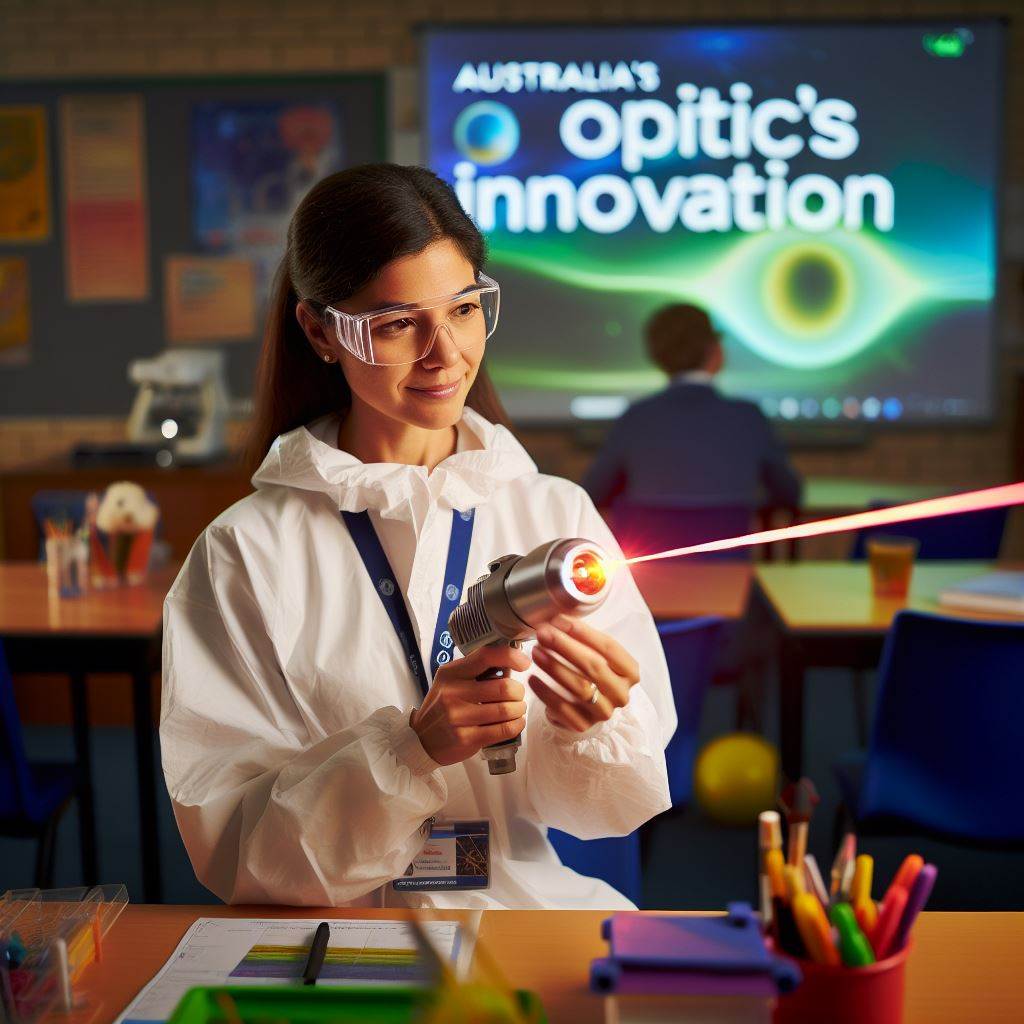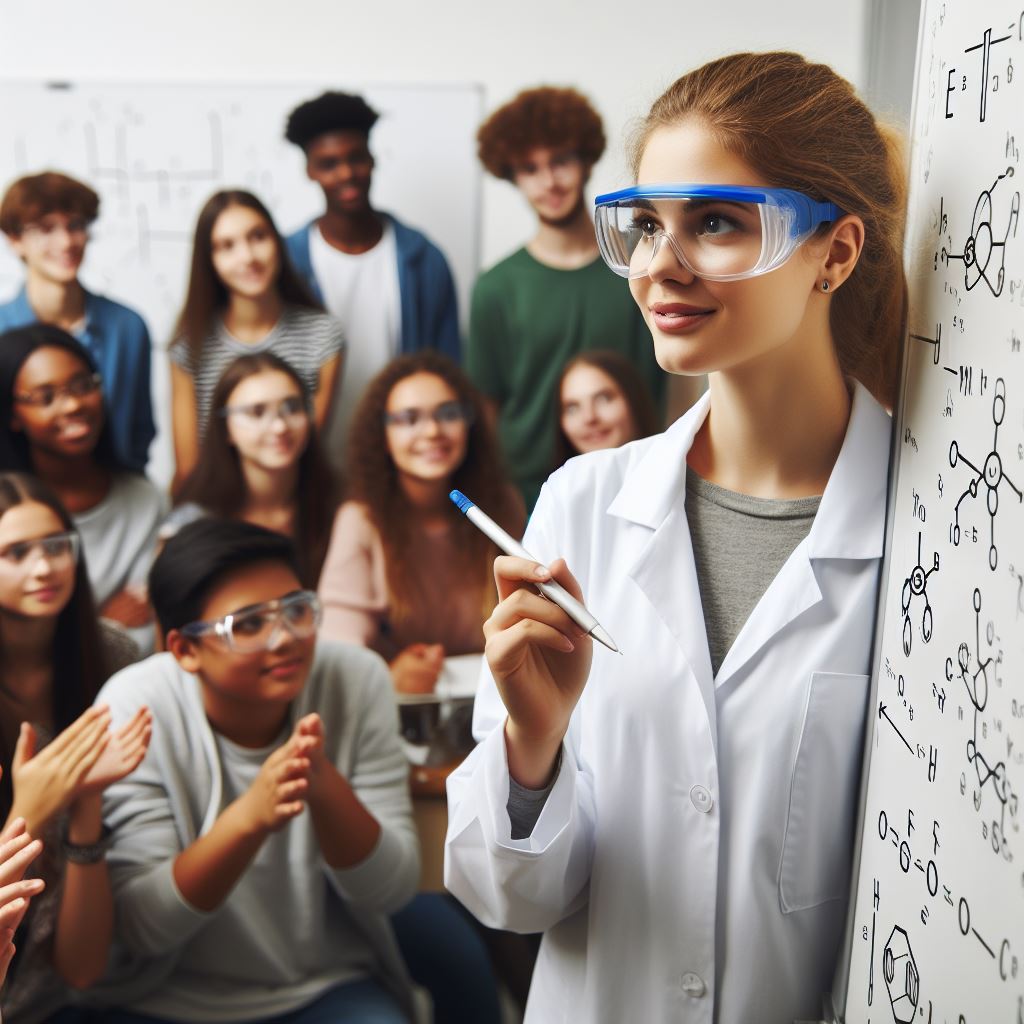Introduction
Physics outreach programs are initiatives designed to promote the understanding and appreciation of physics among the general public.
These programs aim to engage and educate people of all ages through various interactive activities, demonstrations, and workshops.
By bringing physics into the community, these programs create opportunities for individuals to explore the wonders of the universe and foster a passion for the subject.
The Importance and Benefits
Physics outreach programs play a crucial role in bridging the gap between the scientific community and the general public.
They serve as a platform for scientists and researchers to share their knowledge and enthusiasm, inspiring others to pursue scientific careers.
These programs also help dispel misconceptions about physics, making it more accessible and relatable to non-experts.
The benefits of physics outreach programs are vast and diverse.
They encourage curiosity and critical thinking, promoting scientific literacy and a deeper understanding of the world around us.
By engaging with physics concepts in a hands-on manner, participants develop problem-solving skills and gain confidence in their abilities.
Furthermore, these programs can inspire the next generation of scientists, fostering a love for physics and potentially leading to future breakthroughs and discoveries.
Physics outreach programs also have societal benefits.
They foster a sense of community and encourage collaboration among participants, creating networks of like-minded individuals.
By increasing the appreciation for science, these programs contribute to a scientifically literate society, which in turn can lead to informed decision-making and advancements in technology and innovation.
Basically, physics outreach programs are essential in promoting physics education, fostering scientific curiosity, and inspiring individuals to engage with the subject.
Through interactive activities and demonstrations, these programs have the power to ignite a lifelong passion for physics and contribute to the overall advancement of scientific knowledge.
Overview of Physics Outreach Programs in Australia
Physics Outreach Programs in Australia play a crucial role in making science accessible and engaging for diverse audiences.
These initiatives aim to inspire interest and curiosity in physics through interactive and educational activities.
Several organizations and institutions across the country actively contribute to these programs, fostering a deeper understanding of the wonders of physics.
Australia boasts a vibrant landscape of Physics Outreach Programs designed to bring science closer to communities, schools, and enthusiasts.
These initiatives go beyond traditional classroom settings, embracing interactive and innovative approaches to make physics fascinating for everyone.
Types of Physics Outreach Programs
- Science Shows and Demonstrations: Many outreach programs feature dynamic science shows and demonstrations that captivate audiences with engaging experiments, showcasing the excitement of physics concepts in action.
- School Workshops and Visits: Programs often extend to schools, offering workshops and visits where students can participate in hands-on experiments, fostering a practical understanding of physics principles.
- Public Lectures and Talks: Renowned physicists and experts deliver public lectures and talks, making complex concepts accessible to a broader audience and sparking interest in cutting-edge research.
- Interactive Exhibits and Installations: Collaborations with museums and science centers result in interactive exhibits and installations that allow visitors to explore physics phenomena firsthand, making learning an immersive experience.
- Community Events and Festivals: Physics outreach extends to community events and festivals, where families and individuals can enjoy a blend of entertainment and education, fostering a sense of wonder about the physical world.
Organizations and Institutions Offering Physics Outreach Programs
- Australian Institute of Physics (AIP): AIP actively promotes physics outreach, organizing events, lectures, and workshops to engage students and the public in the wonders of physics.
- National Science Week: An annual celebration, National Science Week hosts numerous physics-related events across Australia, encouraging participation and exploration.
- CSIRO Education: CSIRO, the Commonwealth Scientific and Industrial Research Organisation, offers educational resources and programs, including physics-focused activities for schools.
- Physics Education Centre (PEC): PEC, based in Western Australia, collaborates with schools and communities to deliver physics workshops and engage students in the joy of scientific discovery.
- Australian Synchrotron: This research facility in Victoria conducts educational programs, allowing students and the public to explore the world of synchrotron science and its applications.
Overall, Physics Outreach Programs in Australia play a pivotal role in bridging the gap between scientific knowledge and the wider community.
These programs, offered by various organizations and institutions, contribute to making physics accessible, engaging, and enjoyable for people of all ages and backgrounds.
Read: Must-Attend Chemistry Conferences in Aus
The Purpose and Goals of Physics Outreach Programs
The main objectives and goals of physics outreach programs
- One of the main objectives of physics outreach programs is to make physics more accessible to the general public.
- These programs aim to demystify the complexities of physics and foster a sense of curiosity among individuals.
- Physics outreach programs strive to inspire interest in STEM fields, particularly among young people.
- They aim to engage the public in hands-on activities and interactive demonstrations to make physics concepts tangible.
- Physics outreach programs also aim to promote scientific literacy and critical thinking skills.
- By showcasing the practical applications of physics, these programs aim to instill an appreciation for the subject.
- They also strive to bridge the gender gap in STEM by encouraging more girls to pursue physics and related disciplines.
- Physics outreach programs often seek to reach marginalized communities and individuals who may not have access to formal physics education.
- They aim to break down barriers and make physics inclusive for individuals from diverse backgrounds.
- These programs also serve as a platform for networking and mentorship, connecting aspiring physicists with professionals in the field.
Exploring how physics outreach programs engage and inspire the public, especially youth, in physics and STEM fields
- Physics outreach programs organize science festivals, workshops, and exhibitions to showcase the wonders of physics.
- They often collaborate with schools and educational institutions to bring physics demonstrations and experiments to classrooms.
- These programs engage with social media to create online communities and share interactive content related to physics.
- Physics outreach programs frequently organize science communication competitions to encourage individuals to explain physics concepts in accessible ways.
- They establish partnerships with museums, science centers, and community organizations to reach a wider audience.
- Physics outreach programs often feature guest speakers, including physicists, who share their experiences and insights with the public.
- These programs collaborate with industry professionals to showcase the practical applications of physics in everyday life.
- Physics outreach programs organize field trips and visits to physics research facilities to expose participants to cutting-edge research.
- They offer mentorship programs where students can connect with mentors who guide them in their physics and STEM journeys.
- Physics outreach programs provide resources, such as educational materials and online platforms, to facilitate self-directed learning in physics.
Generally, physics outreach programs have the purpose of making physics accessible to the public and inspiring individuals, especially youth, to engage with the subject and pursue STEM fields.
These programs aim to demystify physics, promote scientific literacy, and bridge the gender gap in STEM.
Through hands-on activities, interactive demonstrations, and collaborations with various organizations, physics outreach programs strive to create inclusive and engaging environments where individuals from diverse backgrounds can explore and appreciate the wonders of physics.
Read: Innovative Chemistry Startups in Australia
Activities and Initiatives in Physics Outreach Programs
Examples of the types of activities and initiatives typically found in physics outreach programs
Physics outreach programs in Australia offer various activities and initiatives to engage and educate the public about physics concepts.
These programs serve as a platform for promoting scientific literacy and fostering an interest in physics among people of all ages and backgrounds.
Here are some examples of the types of activities and initiatives typically found in physics outreach programs:
Interactive experiments, workshops, public lectures, and hands-on demonstrations
Interactive experiments
Physics outreach programs often feature interactive experiments that allow participants to explore scientific concepts firsthand.
These experiments provide a hands-on approach to learning and make physics more accessible and engaging.
For example, participants might be able to conduct experiments on electricity, magnetism, or motion, using simple materials or specialized equipment.
Workshops
Workshops are a popular component of physics outreach programs.
These sessions aim to provide in-depth knowledge about specific physics topics and concepts.
Through workshops, participants can gain a deeper understanding of principles such as optics, mechanics, or thermodynamics.
These workshops might involve problem-solving activities, group discussions, or practical demonstrations to enhance the learning experience.
Public lectures
Physics outreach programs often organize public lectures by experts in the field.
These lectures are designed to disseminate knowledge and inspire curiosity among attendees.
Renowned physicists and scientists share their research findings and breakthroughs, making complex theories accessible to a wider audience.
Public lectures not only educate people but also encourage them to ask questions and engage in scientific discussions.
Hands-on demonstrations
Hands-on demonstrations play a crucial role in physics outreach programs.
These demonstrations involve the use of interactive exhibits or models that elucidate complex scientific concepts.
Participants can witness the applications of physics principles to real-world scenarios, enhancing their understanding.
For instance, demonstrations on optics might involve constructing a simple telescope or using lenses to manipulate light.
Science festivals and events
Physics outreach programs often take part in science festivals or community events to reach a larger audience.
These festivals provide a platform where different STEM disciplines, including physics, can showcase interactive exhibits and demonstrations.
Activities like science fairs, space simulations, or robotics competitions enable participants to explore physics in a fun and interactive manner.
School visits
Physics outreach programs regularly visit schools to engage students in scientific activities and demonstrations.
These visits allow students to actively participate in experiments, workshops, or demonstrations that align with their curriculum.
By bringing physics concepts to life, these programs aim to inspire and ignite an interest in physics among young learners.
Your Personalized Career Strategy
Unlock your potential with tailored career consulting. Get clear, actionable steps designed for your success. Start now!
Get StartedOnline resources and digital platforms
Many physics outreach programs provide online resources, such as videos, podcasts, or interactive simulations.
These digital platforms offer accessible and self-paced learning opportunities for individuals who cannot attend physical events.
Online resources can range from virtual physics experiments to educational games, creating an immersive learning experience accessible to a broader audience.
Collaborations with museums and science centers
Physics outreach programs often collaborate with museums and science centers to expand their reach.
These collaborations result in dedicated physics exhibits or interactive zones where visitors can engage with hands-on demonstrations and exhibits related to physics concepts.
By leveraging the existing infrastructure of museums and science centers, outreach programs can reach a diverse audience and make physics more accessible to the public.
Physics outreach programs in Australia continuously strive to make physics engaging, understandable, and enjoyable for people with different backgrounds and levels of scientific understanding.
By providing interactive experiments, workshops, public lectures, hands-on demonstrations, and leveraging various platforms, they inspire curiosity and foster a love for physics among the wider community.
Through such initiatives, these programs contribute to the development of scientific literacy and an appreciation for the fascinating world of physics.
Read: Navigating Chem Grad Studies in Australia

Impact and Benefits of Physics Outreach Programs
Physics outreach programs in Australia have proven to have a positive impact on students and the community. These programs aim to increase interest in physics, improve science literacy, and promote diversity in STEM fields.
Positive impact on students
- Engagement: Physics outreach programs provide hands-on activities that make learning physics enjoyable and engaging.
- Curiosity: Students develop a curiosity for the subject as they witness the practical applications of physics concepts.
- Confidence: By actively participating in experiments and demonstrations, students gain confidence in their scientific abilities.
- Critical thinking: These programs foster critical thinking skills by encouraging students to analyze and solve real-world problems.
- Skills development: Students acquire important skills such as data collection, analysis, and presentation—essential for future scientific endeavors.
Positive impact on the community
- Science literacy: Physics outreach programs aim to improve science literacy among the general public, making them more informed about scientific concepts and developments.
- Public engagement: These programs actively involve the community in scientific activities, fostering a sense of community participation in research and development.
- Career awareness: By exposing the community to the wonders of physics, outreach programs raise awareness about career opportunities in STEM fields.
- Inspiration: Witnessing the exciting experiments and demonstrations can inspire a younger generation to pursue careers in science and technology.
- Community empowerment: Physics outreach programs empower individuals by providing them with knowledge and skills to understand and contribute to scientific discussions.
Increase interest in physics
- Fascination: Physics outreach programs spark fascination in the subject by showcasing its relevance to everyday life.
- Practical applications: Students and the community learn how physics is used in various industries, such as telecommunications, renewable energy, and robotics.
- Real-world connections: These programs bridge the gap between theoretical concepts taught in classrooms and their practical applications, generating interest.
- Interactive learning: Physics outreach activities encourage interactive learning, allowing students to actively participate and apply their knowledge.
- Experiential learning: Hands-on experiments and demonstrations make physics concepts more tangible and memorable.
Improve science literacy
- Accessible language: Physics outreach programs explain complex scientific concepts in simple, understandable language.
- Demystify physics: By breaking down misconceptions and stereotypes, these programs make physics more accessible to people of all backgrounds.
- Broaden knowledge: Participants of these programs gain a broader understanding of physics beyond what is covered in textbooks.
- Continued learning: Outreach programs often provide resources and references for participants to continue their scientific exploration beyond the program.
- Active engagement: Physics outreach activities involve individuals in hands-on experiments, fostering a deeper understanding of scientific principles.
Promote diversity in STEM fields
- Inclusivity: Physics outreach programs actively target underrepresented groups and create a welcoming environment for everyone.
- Role models: By showcasing diverse role models in physics, these programs inspire individuals from all backgrounds to pursue STEM careers.
- Breaking stereotypes: Physics outreach programs challenge stereotypes associated with scientists, making the field more enticing to diverse groups.
- Equal opportunities: These programs aim to provide equal opportunities for all individuals to access and excel in STEM education.
- Collaborative learning: Participants in outreach activities work in diverse teams, promoting collaboration and understanding across different backgrounds.
In essence, physics outreach programs in Australia have a significant impact on students and the community. They increase interest in physics, improve science literacy, and promote diversity in STEM fields.
These programs play a crucial role in inspiring the next generation of scientists and fostering an informed and engaged community.
Read: Balancing Lab Work and Life in Australia
Gain More Insights: Biology Internships: Opportunities in Australia
Success Stories and Case Studies
Share success stories and case studies from physics outreach programs in Australia
Physics outreach programs play a crucial role in promoting interest and engagement in the field of physics among individuals and communities in Australia.
These programs have had numerous success stories and case studies that demonstrate their positive impact.
Here, we highlight some specific individuals and communities that have been positively influenced by these programs:
Specific individuals or communities that have been positively impacted by these programs
Indigenous Communities
- The University of Adelaide’s Aboriginal Summer School for Excellence in Technology and Science (ASSETS) program has successfully engaged Aboriginal and Torres Strait Islander students in physics.
- Through hands-on experiments and interactive workshops, this program has helped increase interest and participation in physics among these communities.
Rural Students
- The University of Melbourne’s Rural School Access Program (RSAP) has reached out to students from remote and rural areas, providing them with opportunities to learn and experience physics.
- By conducting physics workshops and mentorship programs, RSAP has enabled rural students to access resources and gain knowledge that may not have otherwise been available to them.
Underrepresented Groups
- The Australian Institute of Physics (AIP) runs the Women in Physics (WiP) group, which aims to address the gender imbalance in the field.
- Through networking events, conferences, and seminars, WiP has successfully encouraged more women to pursue careers and education in physics.
School Students
- The Australian Science Olympiad program identifies and nurtures talented physics students in secondary schools.
- By providing additional training and resources, this program has helped students excel in physics at a national and international level.
Indigenous Physicists
- Dr. Duane Hamacher, an Indigenous astrophysicist, is a distinguished example of an individual who has greatly impacted Indigenous communities through his outreach efforts.
- He has worked closely with Aboriginal elders to incorporate Indigenous knowledge systems into the teaching of physics, fostering cultural pride and engagement.
Mentoring Programs
- Various mentoring programs, such as the Student Ambassadors for the Australian Institute of Physics (SA-AIP), connect physics students with professionals in the field.
- These programs offer guidance, advice, and support to students, fostering their passion for physics and equipping them with the necessary skills for future success.
Regional Initiatives
- The Physics Education Group in Queensland (PEG-Q) organizes regional conferences and workshops to enhance the teaching and learning of physics.
- These initiatives have provided teachers with additional resources, strategies, and networking opportunities, resulting in improved physics education across various regions.
Community Engagement
- The Science Experience program, in collaboration with universities, provides hands-on physics activities for high school students.
- By showcasing the excitement and relevancy of physics, this program fosters a long-term interest in the subject and encourages students to pursue further study or careers in physics.
These success stories and case studies from physics outreach programs in Australia demonstrate the significant positive impact they have had on individuals and communities.
By inspiring and engaging diverse groups, these programs are instrumental in promoting a greater understanding and appreciation of physics throughout the country.
Delve into the Subject: Australian Universities for Aspiring Chemists
Challenges and Future Directions
Identify challenges and limitations faced by physics outreach programs in Australia
Physics outreach programs in Australia face a number of challenges and limitations.
- Limited funding for outreach initiatives hampers the reach and impact of these programs.
- There is a lack of awareness about the importance and relevance of physics among the general public.
- Difficulties in finding qualified and passionate individuals to lead and organize outreach activities.
- The time and effort required to plan and execute effective outreach events can be overwhelming.
- Transportation logistics pose a challenge in taking physics programs to remote and rural areas.
Possible solutions and future directions to improve these programs and reach a wider audience
To improve these programs and reach a wider audience, several solutions and future directions can be considered.
Stand Out with a Resume That Gets Results
Your career is worth more than a generic template. Let us craft a resume and cover letter that showcase your unique strengths and help you secure that dream job.
Get Hired- Increasing funding and support from government and private sponsors can significantly enhance outreach efforts.
- Collaborating with educational institutions and science organizations to raise awareness about physics.
- Offering training and professional development opportunities for outreach program coordinators and volunteers.
- Exploring innovative ways to engage the public, such as through interactive exhibits and demonstrations.
- Using online platforms and social media to reach a broader audience and generate interest in physics.
- Establishing partnerships with existing community groups and organizations to extend the reach of physics outreach.
- Providing resources and materials to schools and educators to integrate physics into their curriculum.
- Developing outreach programs specifically tailored to remote and rural areas, ensuring accessibility for all.
- Organizing collaborations and exchange programs with international physics outreach initiatives to learn from best practices.
By implementing these solutions and focusing on future directions, physics outreach programs in Australia can overcome their challenges and reach a wider audience.
With increased funding, support, and collaboration, the impact of these programs can be maximized, and more individuals can be inspired by the wonders of physics.
Explore Further: Eco-Research: AU’s Green Future
Gain More Insights: Salary Trends for Research Pros in AU
Conclusion
In closing, physics outreach programs in Australia are essential for science education.
They foster interest, engagement, and understanding among students.
These programs provide hands-on experiences and encourage critical thinking.
Overall, they play a pivotal role in shaping a future generation of scientists and innovators.
With their emphasis on interactive learning, physics outreach programs are crucial in fostering a love for science and promoting scientific literacy.
Through these programs, students gain a deeper understanding of physics concepts and develop the skills necessary for scientific inquiry.
They also provide opportunities for students to engage with professionals in the field, inspiring them to pursue careers in science and contributing to the growth of the scientific community.
Moreover, physics outreach programs promote diversity and inclusion by reaching out to underrepresented groups and encouraging their participation in STEM fields.
By supporting and investing in these programs, Australia can ensure a bright future in science and innovation.




